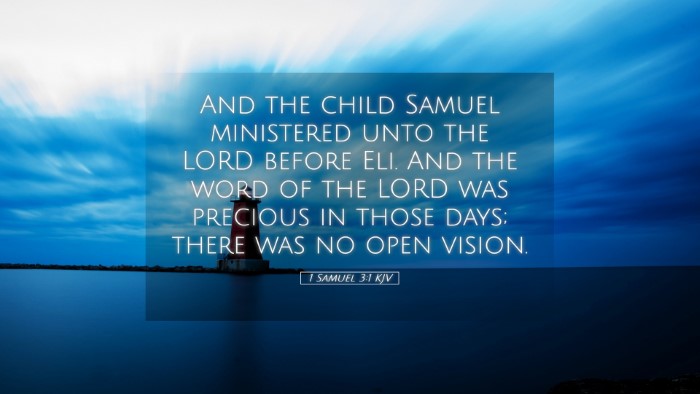Commentary on 1 Samuel 3:1
Text of 1 Samuel 3:1 (ESV): "Now the boy Samuel was ministering to the LORD in the presence of Eli. And the word of the LORD was rare in those days; there was no frequent vision."
Overview
This verse marks a pivotal moment in the narrative of 1 Samuel, introducing the young Samuel, who is serving under Eli, the high priest. It sets the tone for the spiritual context of Israel at the time, where divine communication was sparse. The significance of this verse is profound, as it foreshadows Samuel's upcoming prophetic ministry.
Historical Context
To truly understand the weight of this scripture, one must consider the condition of Israel. The period was marked by spiritual decline. Despite being God’s chosen people, they were engulfed in corruption, idol worship, and moral laxity.
Insights from Matthew Henry
Spiritual Decline: Matthew Henry observes that the "word of the Lord" becoming rare is indicative of a people straying from God. This echoes the biblical truth that God’s voice is often withdrawn in times of corporate disobedience.
Samuel's Role: Henry highlights Samuel's crucial role as a mediator between God and Israel. His youth and dedication underline God’s choice of unexpected vessels for His voice. Despite the spiritual barrenness around him, young Samuel embodies hope for a new beginning in Israel’s communion with God.
Insights from Albert Barnes
Ministering to the LORD: Barnes elaborates on Samuel's ministry, noting that his service under Eli was marked by diligence and commitment. The term "ministering" implies more than mere duty; it suggests a heart in tune with divine presence amidst a decaying religious environment.
Rare Word: Barnes emphasizes the rarity of prophetic vision, suggesting that the absence of divine communication reflects both the people’s disobedience and God's silent judgment upon them. This creates an atmosphere ripe for God’s intervention through Samuel, signaling a new phase in divine revelation.
Insights from Adam Clarke
Context of Eli's House: Clarke provides an important commentary on the conditions of Eli’s household. The priesthood was corrupted, leading to a spiritual vacuum in Israel. Samuel’s presence in this context serves as a stark contrast, demonstrating the potential for renewal and divine restoration.
Significance of the Vision: He further explores the implications of the absence of visions, arguing that this dearth indicates both a spiritual failing among the people and a divine pause in revealing God’s will. Samuel’s calling to prophesy addresses this void, emphasizing that God is always at work, preparing His servants for his purposes.
Theological Implications
- Theological Reflection on Silence: This verse invites theological reflection on God’s silence and its implications for faith communities today. The absence of prophetic voices challenges congregations to examine their spiritual health.
- God’s Sovereignty in Calling: The calling of Samuel reiterates the theme that God sovereignly raises leaders to address the needs of His people, emphasizing that divine-selection is often independent of human criteria.
- Hope Amid Barrenness: The presence of Samuel during a time of spiritual drought symbolizes hope. The narrative illustrates that God’s plan often unfolds through unexpected and humble beginnings.
Application for Today
This verse offers significant applications for pastors and spiritual leaders. In an age where the word of God may appear rare or misinterpreted, the reminder of Samuel’s faithful ministry is essential. It calls leaders to cultivate environments where God's voice can be heard and where they can faithfully guide their communities back to divine truths.
Students and theologians are encouraged to examine the larger narrative of 1 Samuel, understanding how God’s call often comes amidst hardship and unfaithfulness. There lies an invitation for deep spiritual engagement, prayer, and a commitment to listening for God amidst the noise of contemporary life.


